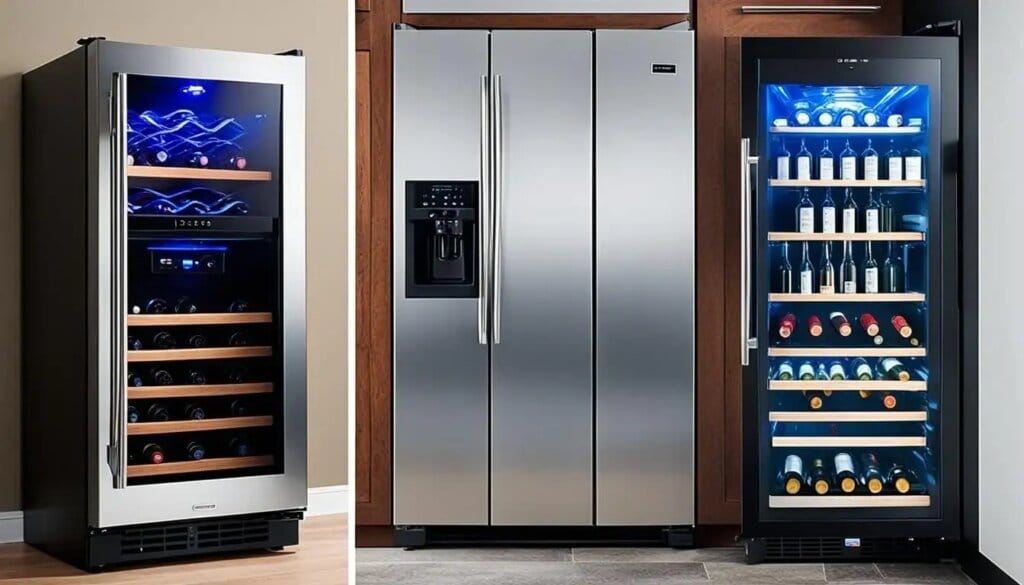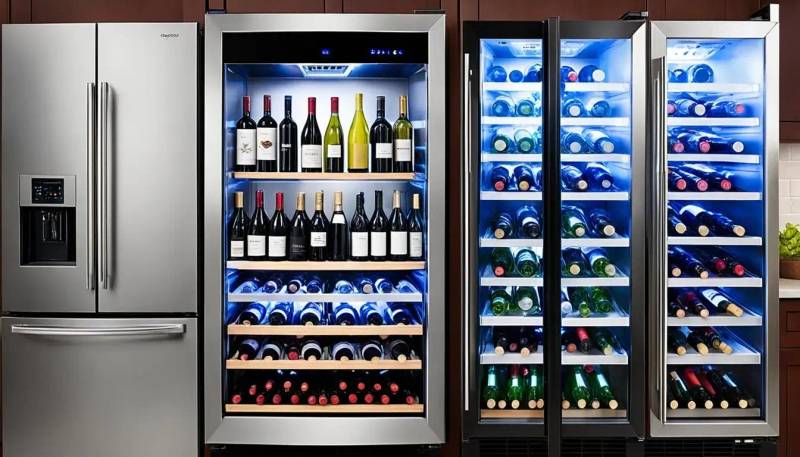Whether you’re a wine connoisseur or simply enjoy the occasional glass, having the right storage solution for your wine collection can make a significant difference in the taste and longevity of your wines. The choice between a wine fridge and a regular fridge is crucial.
A wine fridge, also known as a wine cooler or wine refrigerator, is designed specifically for the proper storage and preservation of wine. Wine fridges offer precise temperature control, vibration absorption, and humidity maintenance, creating an optimal environment for wine preservation.
Traditional refrigerators are not suitable for long-term wine storage due to differences in temperature, vibration, and humidity control.
Let’s explore the key differences between these two options in details to help you make your decision.
Key Takeaways:
- Traditional refrigerators are not ideal for long-term wine storage.
- Wine fridges offer optimal conditions for wine preservation: precise temperature control, vibration absorption, and humidity maintenance.
- Differences in temperature, vibration, and humidity control make wine fridges a better choice for storing wine.
- Proper temperature range (45°F to 65°F) allows wines to develop complexity and depth. Optimal humidity levels in wine fridges keep corks moist and ensure wine freshness. Vibration absorption systems in wine fridges help wines mature undisturbed.
- Investing in a wine fridge ensures the longevity and quality of your wine collection.
- Consider your specific wine storage needs when choosing between a wine fridge and a regular fridge.
Wine Fridge vs Regular Fridge: Which One Do I Need?
Selecting the correct storage solution is crucial for preserving your wine collection. Although a regular fridge may appear practical and budget-friendly, dedicated wine fridges provide superior benefits for long-term storage.
Traditional refrigerators do not fulfill the specific needs for wine storage, such as precise temperature control, vibration reduction, and adequate humidity levels. Opting for a wine fridge guarantees that your wines are preserved under ideal conditions for long-term storage.
Here are some key differences in summary:
1. Temperature Control
Maintaining the correct temperature is essential for preserving the flavors and aromas of wine. Regular refrigerators are usually too cold for wine storage, leading to a loss of delicate characteristics. Wine fridges are specifically made to keep a steady and optimal storage temperature for wine, typically ranging from 45°F to 65°F.
2. Vibration Absorption
Vibrations can harm wine aging by interfering with natural maturation. Regular fridges with compressors create vibrations that disrupt sediment in wine bottles, affecting overall quality. Wine fridges have vibration absorption systems to reduce tremors, helping wines age undisturbed and gracefully.
3. Humidity Control
Maintaining proper humidity levels is essential for preserving wine corks and preventing oxidation. Regular refrigerators have low humidity, drying out corks and letting air spoil the wine. Wine fridges keep humidity at 50-80%, keeping corks moist and wine protected from oxidation.
4. Contamination Control
Wine refrigerators maintain the quality and taste of each bottle by creating a controlled and odor-free space. Unlike traditional fridges that can absorb food odors, affecting the wine’s flavor and aroma, wine refrigerators provide a dedicated environment to preserve the integrity of the wine.
Temperature Differences
Temperature plays a critical role in the proper storage of wine. Maintaining the right temperature is essential to preserve the flavors, aromas, and overall quality of your wine collection. Most wines require a storage temperature between 45°F and 65°F for optimal preservation.
Traditional refrigerators often maintain temperatures below 45°F, which is too cold for wine storage. Consistency in temperature is equally important, as fluctuations can have detrimental effects on your wines. Corks can dry out, crack, or even push out, leading to spoilage and ruining your cherished bottles.
That’s where wine fridges shine. Designed specifically for wine storage, these specialized appliances ensure a stable and optimal temperature to protect the integrity of your wines. With temperature control features, wine fridges provide the ideal environment for long-term wine storage.
| Traditional Refrigerator | Wine Fridge |
|---|---|
| Typically maintains temperatures below 45°F, which is too cold for wine storage | Maintains the optimal temperature range of 45°F to 65°F for wine preservation |
| Inconsistent temperature fluctuations can lead to cork drying, cracking, and spoilage | Provides a stable and consistent temperature, protecting wine from temperature-related damage |

Vibration Differences
Vibration plays a crucial role in the maturation process of wine.
- Household regular refrigerators with compressors can generate vibrations that disrupt the natural aging of wine and impact its flavors. This is where wine fridges come in.
- Wine fridges are equipped with built-in vibration absorption systems, designed to minimize tremors and ensure that your wines remain undisturbed as they mature at a natural pace.
Having a wine fridge with vibration absorption capabilities is essential for wine enthusiasts who want to preserve the integrity and quality of their collection. With a wine fridge, you can rest assured that your wines are not being disturbed by external vibrations, allowing them to develop their unique flavors and aromas.
| Vibration | Regular Fridge | Wine Fridge |
|---|---|---|
| Vibrations Generated | Yes | No |
| Effect on Wine Maturation | Disrupts natural aging process and affects flavors | Ensures wines remain undisturbed and mature naturally |
| Impact on Wine Quality | Can negatively impact flavors and aromas | Promotes development of unique flavors and aromas |
Humidity Control Differences
Wine is known for its complex and delicate flavors and humidity is a critical factor in wine storage. High humidity levels help keep the corks in wine bottles moist and airtight, preventing air from entering the bottle and compromising the quality of the wine.
A traditional fridge, designed to suppress humidity, can shrink corks and cause the corks to dry out. That allows neighboring odors to seep into the wine, leads to the potential for wine oxidation and spoilage, affecting its taste.
Wine refrigerators, on the other hand, are equipped with humidity control systems that maintain the ideal humidity levels for wine storage. These specialized fridges prevent the corks from drying out, keep corks impermeable and moist. That ensures that the wine remains unaffected by external odors, preserves the wine’s natural flavors.
Investing in a wine fridge provides you with the peace of mind that your wines will be stored in the optimal conditions for long-term storage. Whether you are building a collection or simply enjoy aged wine, a wine fridge offers the benefits necessary to preserve the quality and flavors of your favorite wines.
Contamination Differences
Wine refrigerators play a crucial role in maintaining the quality and taste of each bottle by creating a controlled and odor-free setting. Unlike traditional refrigerators, wine coolers are specifically crafted to prevent odor contamination.
Regular fridges, typically stocked with various food items emitting strong odors, can negatively impact the flavor and aroma of wines stored alongside. This influence on the wine’s profile can diminish the enjoyment and appreciation of each bottle.
| Contamination Factors | Traditional Fridge | Wine Fridge |
|---|---|---|
| Humidity Levels | Low humidity can cause corks to dry out and shrink, potentially leading to oxidation and spoilage. | Optimal humidity levels are maintained to keep corks moist and airtight, preserving the wine’s quality. |
| Odor Contamination | Neighboring food odors can seep into the wine bottles, altering the taste and aromas. | Specialized design prevents odor contamination, ensuring the wine’s flavors remain unaffected. |
With a wine fridge, you can create a dedicated space to store and showcase your wines, ensuring they are always ready to be enjoyed at their best. Don’t compromise on the quality of your wine collection – choose a wine fridge for long-term storage and savor the rich flavors and aromas of each bottle.

Wine Fridge Features
Wine fridges offer various features designed to cater to the specific needs of wine storage, ensuring that your wines are kept in the optimal conditions for long-term preservation and enjoyment. Here are some key features to consider when choosing a wine fridge:
1. Dual-zone Temperature Control
- A dual-zone wine fridge allows you to store different types of wine at their ideal serving temperatures.
- This feature is particularly beneficial if you have a mix of red and white wines in your collection, as red wines are typically served at slightly higher temperatures than whites.
- With dual-zone temperature control, you can set different zones within the fridge to maintain the perfect temperature for each type of wine.
2. Adjustable Shelving
- Having adjustable shelving in your wine fridge gives you the flexibility to accommodate bottles of various sizes and shapes.
- This feature allows you to reconfigure the shelves as needed to store larger Champagne or Bourgogne (Burgundy) bottles, ensuring that every bottle in your collection fits comfortably and securely.
3. UV Protection
- Exposure to UV light can harm your wines by degrading their flavors and accelerating chemical reactions.
- Wine fridges with UV protection feature tinted or UV-resistant glass doors that filter out harmful UV rays.
- This helps to preserve the quality and integrity of your wines, even if the fridge is placed in a brightly lit area.
4. Humidity Control
- Humidity levels play a crucial role in wine storage. Too high humidity can lead to mold growth, while too low humidity can cause corks to dry out and allow oxygen to seep into the bottles, resulting in spoilage.
- Wine fridges with humidity control features help maintain the optimal humidity level (around 50-70%) to keep corks moist and wines in pristine condition.
5. Other Features
Other additional features that you may find in wine fridges include:
- LED interior lighting for better visibility and ambiance
- Carbon filters to eliminate odors and prevent contamination
- Locking mechanisms for added security
- Auto defrosting to prevent frost build-up

Wine Fridge Buying Guide
When purchasing a wine fridge, consider the following factors to guide you in choosing a suitable appliance for your needs:
- Size: Determine the size of the wine fridge based on the number of bottles you intend to store. Ensure that it has enough capacity to accommodate your current collection and any future additions.
- Installation Type: Decide whether you prefer a built-in, under-counter, or freestanding wine fridge. Consider the available space in your home and the aesthetic you wish to achieve.
- Brand Reputation: Research and select a wine fridge from reputable brands known for their quality, reliability and customer service. Look for customer reviews and ratings to gauge their performance.
- Temperature Range: Assess the ideal temperature range required for your wine collection. Different types of wine have specific temperature requirements for optimal storage and aging.
- Humidity Control: Consider the humidity levels necessary for preserving your wine’s quality. Some wine fridges come with humidity control features to ensure the right moisture levels for wine storage.
Weigh all these factors against your personal preferences and budget when selecting a wine fridge. Making an informed decision ensures that your wine collection receives the ideal conditions for storage and preservation.
| Number of Bottles | Wine Fridge Size |
|---|---|
| Up to 20 bottles | Compact countertop wine fridge |
| 20-50 bottles | Medium-sized freestanding wine fridge |
| 50-100 bottles | Large capacity built-in wine fridge |
| 100+ bottles | Custom wine cellar or walk-in wine fridge |

Preserve Your Wine Collection
Investing in a wine fridge allows you to properly store and preserve your wine collection, ensuring that each bottle is enjoyed at its best. By maintaining the optimal temperature, minimizing vibration, and controlling humidity, wine fridges create an environment that promotes the longevity and quality of your wines.
Wine Storage Tips
- Keep your wine fridge at the recommended temperature range, typically between 45°F and 65°F depends on the type of wine, to maintain the flavors and characteristics of each wine.
- Ensure that your wine bottles are stored horizontally to keep the corks moist and prevent them from drying out.
- Avoid storing wine with strong odors or volatile compounds, as they can penetrate the cork and alter the taste of the wine. Keep fragrant foods and cleaning chemicals away from your wine fridge.
- Organize your wine collection based on its aging potential and drinking order. Separate red wines from white wines and label each bottle to easily locate and select the desired wine.
Wine Preservation
- Preserving your wines in a dedicated wine fridge minimizes the risk of spoilage and ensures that the wines maintain their quality over time.
- With precise temperature control, wine fridges prevent oxidation, slow down the aging process, and preserve the wine’s flavor and aroma.
- By reducing vibrations, the sediments in the wine bottle remain undisturbed, enhancing the overall taste experience.
- Wine fridges maintain optimal humidity levels, keeping the corks moist and ensuring a tight seal to prevent air from entering the bottle.
- A wine fridge not only safeguards the investment you’ve made in your wine collection but also allows you to enjoy each bottle at its best.
Bottom Line
Overall, when it comes to wine storage, the clear winner between a wine fridge and a regular fridge is a dedicated wine fridge.
With its precise temperature control, vibration absorption, and humidity maintenance, a wine fridge provides the optimal conditions for preserving and enhancing your wine collection.
For anyone serious about wine storage and wanting to enjoy their collection at its best, a wine fridge is the ultimate choice. Its specialized features and optimal conditions provide the necessary protection and care for your wines, allowing them to reach their full potential over time.
Elevate your wine experience with a dedicated wine fridge.
Happy cooling!
FoodiesFridge









